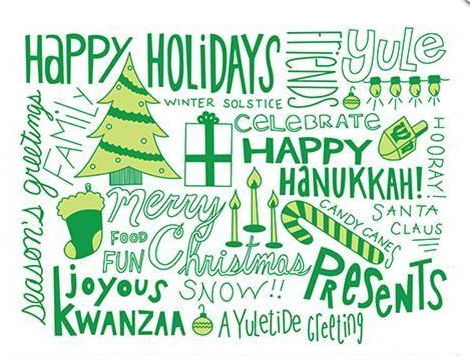With the Holiday season already in motion, it’s important to recognize the vast majority of cultures and the celebrations that follow them. When it comes to greeting others in passing, it’s considerate to say “Happy Holidays” instead of assuming all share the same beliefs. So in order to promote inclusion, here are some upcoming holidays, and the meaning behind them.
One of the first holidays in the winter/autumn months, is Diwali which fell on Nov 12th. Celebrated across Hinduism, Jainism, and Sikhism, the holiday is used to commemorate the victory of light over darkness. Some traditions include decorating with lights, enjoying fireworks, and eating with family and friends.
Next up is Hanukkah; this year the festivities began on December 7th, which ends on December 15th. The holidays is celebrated across the world by the Jewish community. Followed throughout the span of eight days, the holiday is used to show respect for the rededication of the Second Temple of Jerusalem. Each day a candle is lit in order to honor the lasting bits of oil that kept the Temple Menorah burning.
Christmas, falling on December 25th is the day celebrated across Christian faith and is used to honor the birth of Jesus. Traditionally used as a time to exchange gifts due to it originally falling after the Roman holiday Saturnalia, which consisted of presents and feasts. Christmas often serves as an opportunity to decorate with mythical figures such as Santa and listen to festive music.
Kwanzaa, falling on December 26, ending on January 1st, is an African American and Pan-African holiday that celebrates the importance of history, values, family, community, and culture. Celebrated throughout the duration of 7 days, similar to the menorah, people use a Kinara, which is a seven branched candle-holder to signify the 7 Nguzo Saba. Nguzo Saba are the core principle, which consist of unity, self determination, collective responsibility, cooperative economics, purpose, creativity, and faith.
Last but not least, is Lunar New Year which will fall on February 10th. Compared to the Gregorian calendar in which New Years falls on january first, Lunar new year follows the lunisolar calendar which coincides with the moon cycles. Celebrated across many Asian countries, the holiday, aside from serving as a time to celebrate with family, is often used for religious ceremonies, used to pay respects to ancestors, and feast with loved ones.
Acknowledging the things that make us different is a critical step in ensuring inclusivity. So when it comes to celebrating the wide variety of seasonal festivities, don’t forget to say Happy Holidays.







